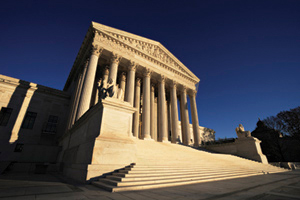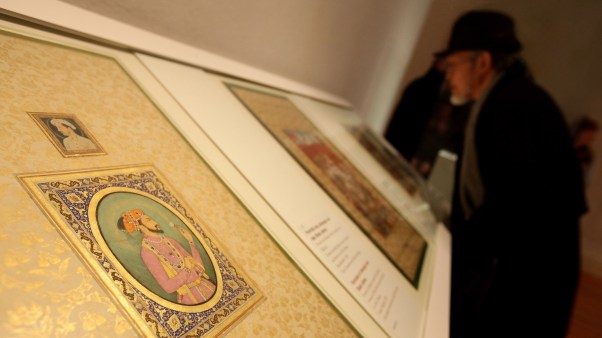The U.S. Supreme Court listened to an unprecedented three days of oral arguments on the constitutionality of the Patient Protection and Affordable Care Act (ACA) after receiving scores of amicus curiae or “friend of the court” briefs from outside groups. While most religious organizations and churches sat this case out, faith-based conservative political groups weighed in with arguments ranging from religious liberty to the legal definition of a “tax.”
 xr:d:DAF8Khy6C9c:4,j:3038095944875624134,t:24020802
xr:d:DAF8Khy6C9c:4,j:3038095944875624134,t:24020802
Alliance Defense Fund (ADF) teamed up with pro-life groups such as Americans United for Life to argue that the act violates the Free Exercise clause of the First Amendment. The ADF coalition argued that the individual mandate would inhibit religious freedom by “effectively forcing” individuals to pay for an abortion premium because they may be enrolled by their employers in plans that cover abortion. The ADF argued that others may be “forced to choose between insufficient plans that respect their conscience versus other plans that happen to require an abortion premium, but that may otherwise better meet their health needs or their choice of doctor network.”
Liberty Counsel, which represented Liberty University in one of the early lawsuits against the act, also argued that the act violates religious freedom, taking aim at the definition of “minimum coverage.” The law outlines a set of essential services that health care plans must include, and the details of these services are determined by the Secretary of Health and Human Services. Liberty said that faith-based groups may be forced to choose between their religious beliefs and complying with the law, which may include the requirement to cover services like contraception that blocks uterine implantation or other services that violate the employer’s faith.
Other faith-based political organizations debated legal issues apart from religious freedom.
The American Center for Law and Justice (ACLJ) was one of many groups to submit briefs on the constitutionality of act’s individual mandate, where all individuals must purchase health insurance or pay a penalty. Like others who oppose the law, the ACLJ argued that Congress overstepped its authority.
“The individual mandate’s unprecedented requirement to buy a product from a private company is inconsistent with our constitutional tradition,” ACLJ wrote. “Although the ACA is the first federal law relying on the Commerce Clause to cross the line between encouraging increased market activity and mandating individual purchases, it will certainly not be the last if the individual mandate is upheld.”
But before the Court weighed the constitutionality of the individual mandate, the justices first considered whether the penalty was a fine or a tax. The distinction is important because it is illegal under the Anti-Injunction Act of 1867 to bring a suit against the government before a tax is levied (to prevent lawsuits that could delay Congress from collecting taxes). If the individual mandate is considered a tax, the Court could punt on all other legal issues and wait until the mandate goes into effect in three years.
The ACLJ and Liberty Counsel each filed separate briefs specifically on the tax question. The ACLJ agreed with the federal government: the individual mandate is not a tax because its function is not to generate revenue but to regulate behavior. Liberty Counsel’s similar argument rested on more technical definitions regarding the Anti-Injunction Act.
One of the remaining legal issues is severability—must the entire law be scrapped if the individual mandate is ruled unconstitutional?
The Family Research Council argued that Congress passed the act only because it included the individual mandate. FRC gave particular attention to the link between the individual mandate and the requirement that insurance companies must accept people with preexisting conditions.
“The individual mandate is the linchpin of the Act, and the congressional objectives cannot be achieved once that linchpin is removed,” the FRC wrote the Court joined on the brief by 27 Members of Congress, including Michele Bachmann (R-MN), Dan Burton (R-IN), Steve King (R-IA), and Mike Pence (R-IN).
In most cases involving fundamental questions of religious liberty, groups like the National Association of Evangelicals, National Council of Churches, U.S. Catholic Bishops, and individual denominations would offer briefs defending First Amendment protections. Some religious bodies took positions on portions of the act when it was being debated in Congress, but church bodies or organizations did not submit arguments to the Court.
The Court is expected to rule on all of these issues—and more—when it hands down its decision at the end of June. For a complete list of briefs for U.S. Department of Health and Human Services v. Florida, see the SCOTUSblog.








